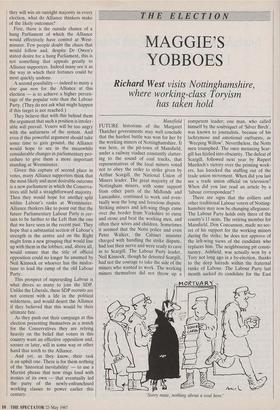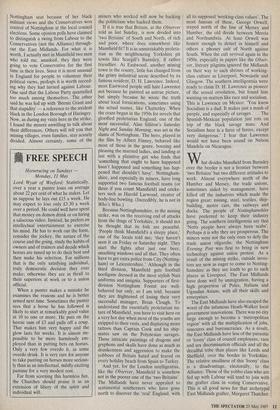THE ELECTION
MAGGIE'S YOBBOES
Richard West visits Nottinghamshire,
where working-class Toryism has taken hold
Mansfield FUTURE historians of the Margaret Thatcher governments may well conclude that the hardest battle was won for her by the working miners of Nottinghamshire. It was here, in the pit-town of Mansfield, under a railway viaduct constantly clatter- ing to the sound of coal trucks, that representatives of the local miners voted not to obey the order to strike given by Arthur Scargill, the National Union of Miners leader. The great majority of the Nottingham miners, with some support from other parts of the Midlands and Lancashire, continued to work and even- tually won the long and ferocious dispute. Striking miners and left-wing thugs came over the border from Yorkshire to curse and stone and beat the working men, and often their wives and children. Sometimes it seemed that the Notts police and even Peter Walker, the Cabinet minister charged with handling the strike dispute, had lost their nerve and were ready to cave in to Scargill. The Labour Party leader, Neil Kinnock, though he detested Scargill, had not the courage to take the side of the miners who wanted to work. The working miners themselves did not throw up a
competent leader; one man, who called himself by the soubriquet of 'Silver Birch', was known to journalists, because of his lachrymose and emotional outbursts, as `Weeping Willow'. Nevertheless, the Notts men triumphed. The once menacing Scar- gill has fizzled into obscurity. The defeat of Scargill, followed next year by Rupert Murdoch's victory over the printing work- ers, has knocked the stuffing out of the trade union movement. When did you last see a trade union official on television? When did you last read an article by a 'labour correspondent'?
There are signs that the colliers and other traditional Labour voters of Notting- hamshire may now be changing allegiance. The Labour Party holds only three of the county's 11 seats. The retiring member for Mansfield, Don Concannon, made no sec- ret of his support for the working miners during the strike; he does not approve of the left-wing views of the candidate who replaces him. The neighbouring pit consti- tuency, Ashfield, was actually won by a Tory not long ago in a by-election, thanks to the deep hatreds within the fraternal ranks of Labour. The Labour Party last month sacked its candidate for the East `Sorry mate, nothing about a soul here.' Nottingham seat because of her black militant views and the Conservatives won control of Nottingham at the local council elections. Some opinion polls have claimed to distinguish a swing from Labour to the Conservatives (not the Alliance) through- out the East Midlands. For what it is worth, I actually met in Mansfield two men who told me, unasked, they they were going to vote Conservative for the first time in their lives. Since it is most unusual in England for people to volunteer their political views, perhaps it is worth record- ing why they had turned against Labour. One said that the Labour Party quarrelled too much among themselves. The other said he was fed up with 'Bernie Grant and that stupidity' — a reference to the strident black in the London Borough of Haringey. Now, as during my visits here in the strike, I found the miners unwilling to talk about their differences. Others will tell you that mining villages, even families, stay acutely divided. Almost certainly, some of the miners who worked will now be backing the politicians who backed them.
If it is true that Britain, as the Observer told us last Sunday, is now divided into `two Britains' of South and North, of rich and poor, where does somewhere like Mansfield fit? It is as unmistakably proleta- rian as the neighbouring Yorkshire pit towns like Scargill's Barnsley, if rather friendlier. At Eastwood, another mining town in the county, little has changed from the grimy industrial scene described by its famous resident, D. H. Lawrence. Indeed, most Eastwood people still hate Lawrence not because he painted an untrue picture, but simply because he wrote the truth about local fornications, sometimes using the actual names, like Chatterley. When the craze began in the 1950s for novels that glorified proletarian England, one of the most successful, Alan Sillitoe's Saturday Night and Sunday Morning, was set in the slums of Nottingham. The hero, played in the film by Albert Finney, behaved like most of those in the genre, boozing and pleasing the married ladies, and landing at last with a plaintive girl who finds that `something that ought to have happened hasn't happened and something has hap- pened that shouldn't have'. Nottingham- shire, and especially its miners, have long supported two famous football teams (or three if you count Mansfield) and cricke- ters such as Harold Larwood, creator of body-line bowling. (Incredibly, he is not in Who's Who.)
Because Nottinghamshire, in the mining strike, was on the receiving end of attacks from the thugs of Yorkshire, it should not be thought that its • folk are peaceful. `People think Mansfield's a sleepy place,' one of the locals told me; 'they haven't seen it on Friday or Saturday night. They start the fights after just one beer, smashing windows and all that. They often have to get extra police from City (Notting- ham) or Leicestershire.' Although in the third division, Mansfield gets football hooligans dressed in the most stylish Nazi uniforms and insignia. Supporters of first- division Nottingham Forest are well- behaved but only, so I am told, because they are frightened of losing their very successful manager, Brian Clough. To understand the essentially proletarian na- ture of Mansfield, you have to visit here on a very hot day when most of the youths are stripped to their vests, and displaying more tattoos than Captain Cook and his ship- mates saw on the Polynesian savages. These intricate paintings of dragons and gryphons and skulls have done as much as drunkenness and aggression to make the yobboes of Britain hated and feared on every holiday beach from Spain to Turkey.
And yet, for the London intelligentsia, like the Observer, Mansfield is somehow not in the poorer one of the 'two Britains'. The Midlands have never appealed to sentimental southerners who have gone north to discover the 'real' England, with all its supposed 'working-class values'. The most famous of these, George Orwell, stayed north of the line of Mersey and Humber, the old divide between Mercia and Northumbria. At least Orwell was honest enough to detect in himself and others a phoney cult of North against South. When the cult revived again in the 1950s, especially in papers like the Obser- ver, literary pilgrims ignored the Midlands on their way to such shrines of working- class culture as Liverpool, Newcastle and Glasgow. The southern intelligentsia were ready to claim D. H. Lawrence as pioneer of the sexual revolution, but found him wanting on matters like race and socialism. This is Lawrence on Mexico: 'You know Socialism is a dud. It makes just a mush of people, and especially of savages . . . The Spanish-Mexican population just rots on top of the black savage mass. And Socialism here is a farce of farces, except very dangerous.' I fear that Lawrence would not have been sound on Nelson Mandela on Nicaragua.
What divides Mansfield from Barnsley over the border is not a frontier between `two Britains' but two different attitudes to work. Almost everywhere north of the Humber and Mersey, the trade unions, sometimes aided by management,' have killed off the industries which made the region great: mining, steel, textiles, ship- building, motor cars, the railways and docks. The people of Nottinghamshire have preferred to keep their industry going. The southern intelligentsia say that `Notts people have always been scabs'. Perhaps it is why they are prosperous. The miners were not the only ones to defy the trade union oligarchs: the Nottingham Evening Post was first to bring in new technology against union protest. As a result of the mining strike, outside inves- tors are now as eager to come to Notting- hamshire as they are loath to go to such places as Liverpool. The East Midlands have done well by immigration, having a high proportion of Poles, Italians and Ugandan Asians, with all their skills and enterprises.
The East Midlands have also escaped the worst of the infamous Heath-Walker local government innovations. There was no city large enough to become a 'metropolitan region' with all the multiplication of jobs, sinecures and bureaucracies. As a result, the East Midlands have less of the parasitic or 'loony' class of council employees, race and sex discrimination officials and all the dreadful tribe than places like Leeds and Sheffield, over the border in Yorkshire. The relative smallness of this 'loony' class is a disadvantage, electorally, to the Alliance. Those of the yobbo class who are fed up with Labour will tend to join with the grafter class in voting Conservative. This is all good news for that archetypal East Midlands grafter, Margaret Thatcher.










































































 Previous page
Previous page